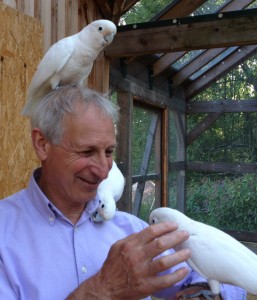The Oxford Summit on Robotics aims to bring together – in an informal way – a small number of internationally-leading researchers in robotics and related areas to discuss and tackle strategic challenges in robotics research. The motivation is to provide an environment and atmosphere in which big ideas can spring to life and grow into strategic initiatives for the robotics community and beyond, without the pressures and distractions usually associated with professional meetings.
In spirit, mission and objective, the Oxford Summit follows in the footsteps of the 2011 Berlin Summit. Additionally, it aims to acknowledge that robotics research is inherently inter-disciplinary. Thus, to provide an outside perspective and maybe even a new impetus, this year there will be a small contingent of researchers looking at behavioural ecology and biological perception, as well researchers from a cross-section of robotics disciplines.
Acknowledgement
The Oxford Summit on Robotics forms this year’s Mahfouz Forum at Pembroke College Oxford. The Mahfouz Forum, which has a focus on subjects which cross disciplines, is run by Fellows of Pembroke College and seeks to engage leading international academics working on a different theme each year, on a global and national basis. The Mahfouz Forum is being generously funded by a benefaction from HE Mahfouz bin Mahfouz, Foundation Fellow of Pembroke College.
Program
The General Idea
The scientific program of the Oxford Summit on Robotics will be concerned with a number of themes to be determined prior to the meeting by the participants. These will form the basis for interactive and interwoven discussion threads. The intention is to let discussions evolve, including a change in emphasis or initiation of other threads in response to the discussions at the meeting.
Each day will consist of three types of sessions: workshop sessions, speaker’s corner and open debate. The workshop sessions will be themed and proceedings will be led by a team of individuals. Speaker’s corner provides a space for short visionary, provocative or risky statements regarding ideas, topics, views or approaches that would normally not be presented at a conference or workshop. Open debate sessions are scheduled with increasing frequency to provide space for previous discussions to overrun and evolve.
Themes
The following themes have been identified as being of interest for this Summit and will provide a context for the workshop sessions (names in brackets indicate theme leads):
- [WS1] Progress vs Progress in Robotics. (Brock, Mason)
- [WS2] Connecting robotics and sensorimotor biology: a back alley or super highway? (Pai, Vijayakumar)
- [WS3] Beyond ML: challenges and opportunities for Robot Learning. (Posner, Toussaint)
- [WS4] How much uncertainty do we really need to represent or reason about? (Fox, Kress-Gazit)
- [WS5] Manipulation is more than just grasping. (Srinivasa, Lozano-Perez)
- [WS6] Lessons to be learned from biologically inspired perception. (Smithson, Stoytchev)
Putative Schedule
While day-to-day proceedings are not cast in stone a putative schedule looks like this:
| WED | THUR | FRI | |
| 08.45 – 09.00 |
Opening | ||
| 09.00 – 10.30 |
Workshop (WS1) |
Workshop (WS4) |
Workshop (WS6) |
| 10.30 – 11.15 |
Speaker’s Corner |
Speaker’s Corner |
Speaker’s Corner |
| 11.15 – 12.45 |
Workshop (WS2) |
Open Debate | Open Debate |
| 12.45 – 14.00 |
Lunch | Lunch | Lunch |
| 14.00 – 15.30 |
Workshop (WS3) |
Workshop (WS5) |
Digest/Closing |
| 15.30 – 16.15 |
Speaker’s Corner |
Speaker’s Corner |
|
| 16.15 – 17.45 |
Open Debate | Open Debate | |
| 18.00 – 22.00 |
Plenary Talk & Dinner |
Plenary
The Mahfouz Forum Public Lecture:
“When Will Your Robot Do What My Bird Does?”
Prof. Alex Kacelnik FRS
Thurs, 19 September 2013, 6pm
The Pichette Auditorium, Pembroke College
Abstract
Many animals display creative problem-solving abilities beyond those of the most advanced current autonomous robots. Should we be able to understand and emulate how they do it, engineers’ ability to build autonomous robots would enter a new and revolutionary phase. Reciprocally, should engineers tell biologists how they build robots capable of performing novel and complex tasks, we might be able to better understand how they (the organisms) do it. Close interaction between comparative cognition and artificial intelligence is thus a supremely timely multidisciplinary task. As a biologist and comparative cognitivist, I will present examples of problem solving performance by birds that challenge our current capability for artificial emulation.

Alex Kacelnik is Professor of Behavioural Ecology at Oxford University and EP Abraham Research Fellow in Zoology at Pembroke College Oxford. He studied biological sciences in Argentina and obtained a D. Phil in Oxford in 1979. After interludes in The Netherlands and Cambridge, Alex returned to Oxford in 1990, where he joined Pembroke College and created the Behavioural Ecology Research Group in the Department of Zoology. His current research deals with comparative cognition, decision-making and brood parasitism. In recent years he has been awarded the Cogito Prize in Switzerland, the de Robertis Medal in Argentina, and the Research Award of the Comparative Cognition Society in USA. He has published numerous research papers in over 30 animal species and is a fellow of the Royal Society.
Participants
Confirmed Participants (so far):
- Tim Barfoot, University of Toronto, Canada
- Oliver Brock, TU Berlin, Germany
- Peter Corke, Queensland University of Technology, Australia
- Andrew Davison, Imperial College, UK
- Dieter Fox, University of Washington, USA
- Cécile Huet, European Commission, Luxembourg
- Alex Kacelnik, Oxford, UK
- Hadas Kress-Gazit, Cornell, USA
- Tomas Lozano-Perez, MIT, USA
- Matt Mason, CMU, USA
- Paul Newman, Oxford, UK
- Dinesh Pai, University of British Columbia, Canada
- Jan Peters, TU Darmstadt, Germany
- Ingmar Posner, Oxford, UK
- Brian Rogers, Oxford, UK
- Hannah Smithson, Oxford, UK
- Sidd Srinivasa, CMU, USA
- Alex Stoytchev, Iowa State University, USA
- Marc Toussaint, University of Stuttgart, Germany
- Ben Upcroft, Queensland University of Technology, Australia
- Marco Vasconcelos, University of Minho, Portugal
- Sethu Vijayakumar, University of Edinburgh, UK
Venue
Pembroke College

Founded in 1624, informality and distinction have always rubbed shoulders at Pembroke. This was Samuel Johnson’s college, as well as JRR Tolkien’s and Senator J. William Fulbright’s. Recent Masters include the neurologist and record-breaking runner, Sir Roger Bannister, senior Middle Eastern diplomat Sir Geoffrey Arthur and Professor of Law, Robert Stevens.

In addition to a Governing Body of 38 Fellows and 4 Advisory Fellows (alumni who lend their professional experience to Pembroke as Trustees or non-executive members of the Governing Body), the college provides an intellectual home to just under 400 Undergraduates, as well as around 30 Visiting Students and about 100 Graduate Students.

Pembroke is very proud to recently have extended the College’s main site to the south by providing state-of-the-art facilities, including a series of meeting and teaching rooms, a new multi-purpose auditorium and a dedicated café. We hope that, together with the main site, these will provide a particularly amenable backdrop for this Summit.
Travel
How to get to Pembroke College, Oxford
Oxford is about 60 miles (90 kms) northwest of London and has excellent road and national rail links. Regular coach services connect Oxford with the capital and also with Heathrow, Gatwick, Stansted and Luton airports. Pembroke College is located on Pembroke Square just off St. Aldates in central Oxford.
By air
If you are traveling from London Heathrow or Gatwick, The Airline coach service travels directly to Oxford (ca. 90 mins travel time departing every half hour at peak time). Stay on the coach until the end of the line, Gloucester Green Bus Station. Then it is approximately a 10 minute walk to the College. For more information (tel: +44 (0)1865 785400) or visit www.airline.oxfordbus.co.uk.
London Stansted airport is linked to Oxford by the National Express 757 Coach which runs every 2 hours. There is also a direct train which runs from Birmingham International Airport to Oxford Rail Station.
By train
A direct service operates between Oxford and London Paddington (approximately every 30 minutes), and between Oxford and Birmingham New Street via Banbury and Coventry. Other services operate from the north via Birmingham New Street; from the South via Reading; and from the west via Didcot or Reading. For information contact National Rail Enquiries www.nationalrail.co.uk (tel: +44 (0)8457 484950).
By coach
There is an excellent coach service, the Oxford Tube, which runs frequent buses between central London and Oxford Gloucester Green Bus Station, 24 hours a day. The Oxford Tube service includes Grosvenor Gardens, Marble Arch, Notting Hill Gate, Shepherd’s Bush and Hillingdon.
Parking in Oxford
Many Oxford streets are now closed to traffic and parking is severely limited. If you are planning on arriving by car please advise Pembroke College in advance (see contacts page) to check for available parking spaces on site.
Contact
General Enquiries
For all general enquiries please contact Ingmar Posner (ingmar@robots.ox.ac.uk) at the Oxford Robotics Institute in Oxford.
Accommodation & Facilities
For all enquiries and bookings regarding accommodation and facilities please contact the Pembroke College Conference Office. Specifically, one of:
Joanne Bowley
Conference Administrator
Tel: +44 1865 276425
Email: Joanne.Bowley@pmb.ox.ac.uk
Huw Edmunds
Head of Conferences and Events
Tel: +44 1865 286098
Email: Huw.Edmunds@pmb.ox.ac.uk
